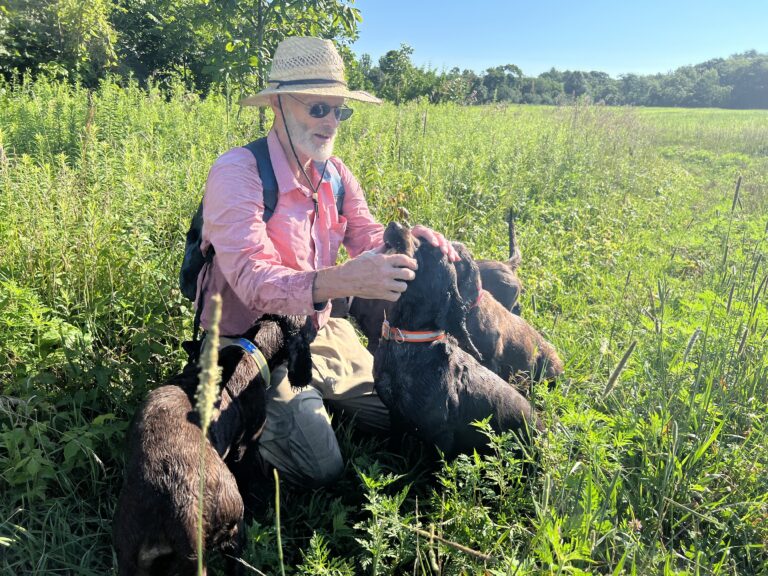DANVILLE — On a sunny morning in Kennekuk County Park, researchers and veterinary students from the University of Illinois Urbana-Champaign scoured the area for Eastern box turtles – a species known for high-domed shells and colorful spots.
The University of Illinois Wildlife Epidemiology Lab oversees the largest health study of box turtles in the world. The researchers said this is important work, as box turtles are “sentinels of ecosystem health.”
However, Boykin spaniels are the ones leading the way.
John Rucker, a conservation who lives largely in Montana, breeds a special kind of Boykin spaniel.
He trained his dogs to track turtle scent trails, and now works with wildlife groups across the United States. While Rucker describes himself as cynical, he finds pleasure in the natural world.
As the group traverses through tall prairie grass and abandoned cornfields, U of I Veterinary Diagnostic Lab Clinical Associate Professor and Brookfield Zoo veterinarian, Matt Allender, spoke about the thousands of turtles his team has studied in Illinois and Tennessee.

Allender met Rucker while completing his residency in Zoological Medicine at the University of Tennessee.
Despite being fairly common across the U.S., box turtles are at risk from habitat destruction, illegal wildlife trade and disease. A disease called “ranavirus” decimated box turtles in the eastern U.S. as well as in Central Illinois.
Allender described this expedition as part of a larger project called “Wellness of Wildlife.” Laura Adamovicz, a veterinarian and research scientist with the Wildlife Epidemiology Laboratory, also helps lead the project.

By the day’s end, the U of I team found 20 box turtles. Some were hiding under thorny shrubs, while others snacked on blackberries.
Allender said his team’s research can protect turtles and other forms of wildlife for generations to come.
“Health and disease monitoring…have often been neglected in conservation efforts,” Allender said. “If we’re conserving all these habitats and doing all this good work, but we’re creating habitats that can’t support healthy populations, then we’re not actually doing conservation.”
The study of wildlife can also help identify human pandemics before they happen.
“The pathogens affecting humans are often normal viruses or bacteria in wildlife, so sampling and determining the virus and bacteria in all wildlife can give us insight into the pathogens that may contribute to the next pandemic,” Allender said.
Harrison Malkin is a reporter for Illinois Public Media. Follow him @HarrisonMalkin

